Live on the homepage now!
Reader Supported News
On Thursday, in a federal courtroom in Washington, D.C., former President Donald Trump signed a document containing the conditions for his pretrial release. The agreement came with the warning that he could face up to 10 years in prison and/or a $100,000 fine for attempting to intimidate jurors, judges, prosecutors, or witnesses. He also received a verbal admonition at the time from Magistrate Judge Moxila Upadhyaya, clarifying the terms of his release:
I want to remind you that it is a crime to try to influence a juror or to threaten or attempt to bribe a witness or any other person who may have information about your case, or to retaliate against anyone for providing information about your case to the prosecution, or to otherwise obstruct the administration of justice.
The next day, Trump posted on Truth Social a warning in all-caps: “IF YOU GO AFTER ME, I’M COMING AFTER YOU!” Immediately, special counsel Jack Smith’s office asked Judge Tanya Chutkan for a protective order to limit what Trump’s team can do with any evidence that will be shared with them during discovery. The government’s lawyers noted that the former president has been known to share evidence and attempt to influence witnesses in prior lawsuits and that he “has previously issued public statements on social media regarding witnesses, judges, attorneys and others associated with legal matters pending against him.”
When Trump’s lawyers asked for extra time to respond to that motion, Chutkan declined. The Trump team had to respond to the request for a protective order by 5 p.m. Monday, which they did.
On Saturday, Trump posted again, with respect to a key witness: “WOW, it’s finally happened! Liddle’ Mike Pence, a man who was about to be ousted as Governor Indiana until I came along and made him V.P., has gone to the Dark Side.” In separate posts over the weekend and Monday, he then went after Smith and Chutkan by name. To the extent any of this constitutes witness tampering or threats is a tricky legal question to which Trump and his lawyers have already responded by citing his First Amendment rights to say what he wishes about the trial. I asked David Alan Sklansky—who teaches and writes about criminal law, criminal procedure, and evidence at Stanford—to help unpack the contours of a defendant’s right to speak in advance of his trial. Our conversation has been condensed and edited for clarity.
Dahlia Lithwick: It feels like folks are conflating a huge number of ideas when they discuss Trump’s Truth Social posts—witness tampering, threats to the judge and prosecutor, disclosure of evidence, among other things. Will they all fall under the same single protective order the special counsel requested?
David Alan Sklansky: Yes, there are a bunch of different issues here, and no, they don’t all get handled in a single protective order. The protective order the prosecutors have proposed places restrictions on the ways in which Trump and his lawyers can use the information that the prosecutors provide to them. It’s not a gag order. It doesn’t stop Trump from talking about the case—publicly or privately.
From a criminal justice perspective, what is the real concern here? That he is chilling witness testimony? Poisoning the jury pool? Painting a target on the judge?
I think those are all concerns—especially the chilling of witnesses’ testimony, or placing witnesses in danger. One part of the proposed protective order does say that Trump’s lawyers can’t give Trump documents with sensitive information about witnesses, like their home addresses. It says they can show those documents to Trump, but they can’t let him copy down the sensitive information about the witnesses. But there is a broader concern about the safety of witnesses, and efforts to intimidate witnesses or to influence their testimony, and depending on how things go, the judge may wind up issuing other orders responding to those concerns.
We know from Cassidy Hutchinson’s Jan. 6 testimony that Trump made attempts to influence witnesses, through their lawyers or through proxies. Does that enter into Judge Chutkan’s thinking?
Sure. She has to take seriously any possible efforts to intimate witnesses, or anything that might place witnesses in danger.
Robert Reich suggested earlier today that these comments alone mean that Trump should be in jail. That in fact “At this moment, about 400,000 criminal defendants are in jail in the United States awaiting trial because they didn’t meet a condition of their release.” Is there really a scenario under which Trump goes to jail for these kinds of pretrial comments?
It’s hard to imagine him going to jail for the comments that he has made so far on social media. They don’t go far enough. And the prosecutors haven’t done anything to suggest that they might seek to revoke his pretrial release because of any of those comments.
Given that But Free Speech! forms the bulk of Trump’s substantive defense in the D.C. trial, how much will “free speech” protect what he says about the trial as it proceeds? It feels like the more the court tries to keep him from discussing the case in public, the more it feeds his argument that this is all just about his political speech.
There may be some difficult balances to be struck in that regard as this case moves forward. Judge Chutkan will have to strike a balance between, on the one hand, respecting Trump’s First Amendment rights, and allowing him to continue his campaign, and on the other hand protecting the integrity of the trial process—and the safety of potential witnesses.
READ MORE 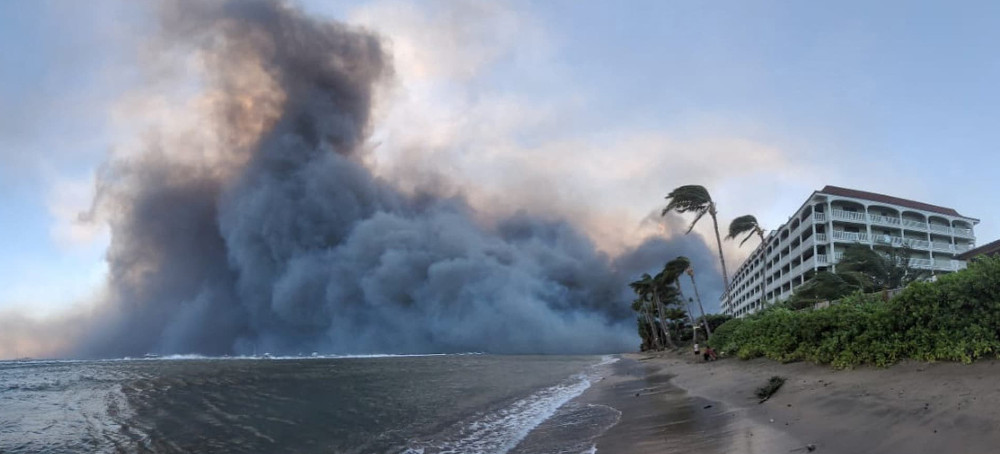 Hundreds of buildings in historic town of Lahaina destroyed in Hawaii wildfires. (photo: AP)
Hundreds of buildings in historic town of Lahaina destroyed in Hawaii wildfires. (photo: AP)
Several thousand residents escape homes as wind-fuelled flames swept across the Maui island resort town of Lahaina.
“As the firefighting efforts continue, 36 total fatalities have been discovered today amid the active Lahaina fire,” the Maui county government said in a statement on Thursday.
The fires began burning in the United States island state early on Tuesday, putting more than 35,000 people on Maui – as well as homes, businesses and utilities – at risk, the Hawaii Emergency Management Agency said in a statement on Wednesday.
The fast-moving flames, fanned by strong winds from Hurricane Dora, sent desperate residents jumping into the ocean to escape.
A video posted on social media showed blazes tearing through the heart of Lahaina, a beachfront town of about 12,000 residents that is popular with tourists, and sending up huge plumes of black smoke.
“We just had the worst disaster I’ve ever seen. All of Lahaina is burnt to a crisp. It’s like an apocalypse,” said resident Mason Jarvi, who escaped the fires.
More than 270 buildings have been damaged or destroyed in Lahaina.
“Much of Lahaina on Maui has been destroyed and hundreds of local families have been displaced,” said Josh Green, the town governor.
Adam Weintraub, a spokesperson with the Hawaii Emergency Management Agency, told Al Jazeera the devastated areas resembled a “war zone”.
“Some of the aerial footage that we’ve seen from the area reminds me of the pictures from Dresden from World War II,” Weintraub said, referring to the German city almost destroyed by Allied bombardment.
He said additional aid had reached the affected areas on Thursday, but that the fires had hampered access and communications in several areas, complicating rescue services and the delivery of assistance.
At least 2,100 people were sheltered by the American Red Cross on Maui on Wednesday and more evacuation efforts were under way.
“We are working with the county, with the American Red Cross and with our colleagues in Honolulu county to help remove visitors and displaced residents in Maui island and find other accommodation or travel arrangements,” Weintraub added.
Al Jazeera’s Daryl Huff, reporting from Wailuku, Maui, said the winds had died down slightly after blowing at 96 to 112 kilometres per hour (60 to 70 miles per hour), giving firefighters a chance to start putting out the flames.
“But there’s still enough wind to whip these fires up. That’s why they are concerned in Lahaina,” Huff said.
READ MORE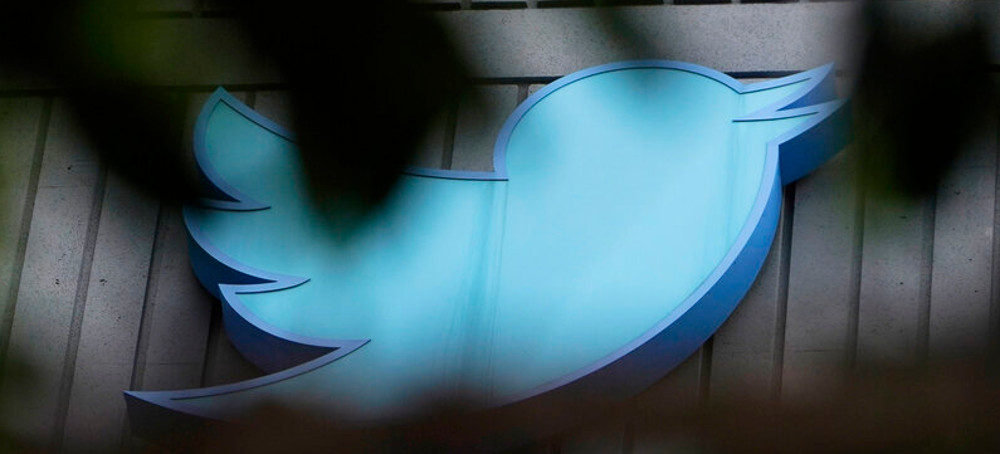 Twitter's blue bird is seen on its headquarters building in San Francisco on July 24. (photo: Godofredo A. Vasquez/AP)
Twitter's blue bird is seen on its headquarters building in San Francisco on July 24. (photo: Godofredo A. Vasquez/AP)
On Jan. 17, 2023, prosecutors applied for, and received, a search warrant directing Twitter, a company now known as X, to produce data and records related to the @realDonaldTrump account, documents from the U.S. Court of Appeals for District of Columbia Circuit show.
This warrant was tied to the special counsel's investigation into Trump and his involvement in attempts to overturn the 2020 election. Trump is now facing four criminal charges related to this investigation. He's pleaded not guilty.
Trump was permanently suspended from Twitter just days after the Jan. 6, 2021 riot at the U.S. Capitol. His account was reinstated on X, but he has not tweeted since Jan. 8, 2021, and instead uses his Truth Social platform.
The warrant was served along with an order that prohibited Twitter from notifying anyone about the existence or contents of the warrant.
Prosecutors shared fears with the court that if Trump knew about the warrant that he would jeopardize the investigation by giving him "an opportunity to destroy evidence, change patterns of behavior [or] notify confederates."
The social media company subsequently fought the Justice Department on this warrant request as well as its demand not to disclose this information to Trump or others, the court filings show.
In a since-rejected appeal, Twitter had argued that the nondisclosure order violated the First Amendment and the Stored Communications Act.
Twitter did eventually comply with the warrant, but failed to produce all of the requested information until three days after a court-ordered deadline, placing the company in contempt and was ordered to pay a $350,000 fine for the delay.
Trump called the revelation of this search warrant a "major 'hit' on my civil rights" on his Truth Social account.
A representative for the Justice Department declined to comment.
How common are social media search warrants?
Very, according to Mary Graw Leary, a former federal prosecutor.
Social media is now a fabric of nearly everyone's lives, so in many criminal investigations its highly likely that there will be subpoenas into a subject's accounts and overall digital presence, she said. Leary is also currently the senior associate dean for academic affairs at The Catholic University of America.
If a potential target of an investigation is keeping a social media account, essentially a "public diary," during the time frame in question "of course" investigators would want all the records tied to these accounts, she said.
It's less common for a nondisclosure order to be requested as it was in this investigation into Trump, but it's not unexpected, she noted.
"That is usually related to the status of the investigation," she said. Meaning, as it seems to have in this case, prosecutors will tread lightly to avoid harming the investigation by informing potential targets or witnesses of this request.
It appears in this case that federal prosecutors and Twitter attorneys litigated the issue heavily and that steps taken by investigators seem consistent with statutory law, according to Leary.
So, as for Trump's assertions his "rights" were violated? "It's hard to see what rights he is referring to that have been violated," she said.
READ MORE 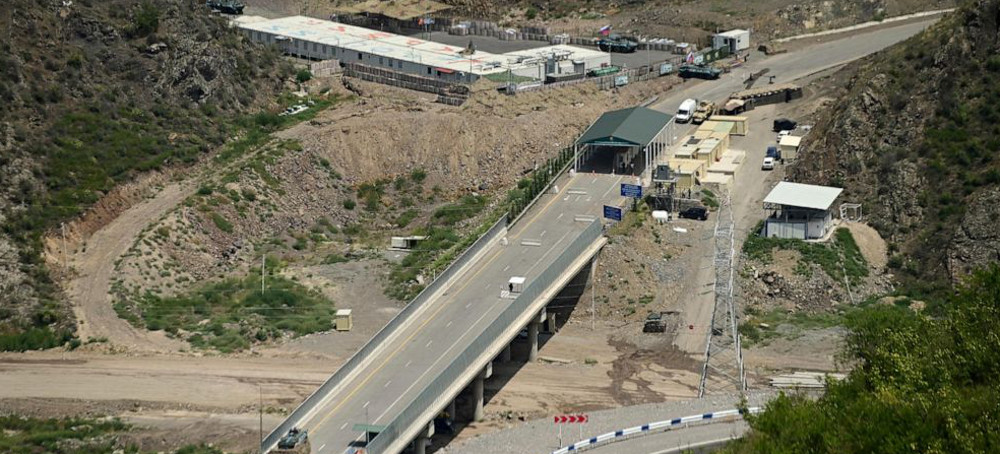 A bridge and a checkpoint are seen on a road towards the separatist region of Nagorno-Karabakh, in Armenia, Friday, July 28, 2023. (photo: AP)
A bridge and a checkpoint are seen on a road towards the separatist region of Nagorno-Karabakh, in Armenia, Friday, July 28, 2023. (photo: AP)
The former chief prosecutor of the International Criminal Court is warning that Azerbaijan is preparing genocide against ethnic Armenians in its Nagorno-Karabakh region
A report by Luis Moreno Ocampo issued Tuesday said Azerbaijan's blockade of the only road leading from Armenia to Nagorno-Karabakh seriously impedes food, medical supplies and other essentials to the region of about 120,000 people.
“There is a reasonable basis to believe that a genocide is being committed,” Ocampo's report said, noting that a U.N. convention defines genocide as including "deliberately inflicting on the group conditions of life calculated to bring about its physical destruction.”
“There are no crematories and there are no machete attacks. Starvation is the invisible genocide weapon. Without immediate dramatic change, this group of Armenians will be destroyed in a few weeks,” the report said.
Nagorno-Karabakh is a region within Azerbaijan that came under the control of ethnic Armenian forces backed by the Armenian military in separatist fighting that ended in 1994. Armenian forces also took control of substantial territory around the region.
Azerbaijan regained control of the surrounding territory in a six-week war with Armenia in 2020. A Russia-brokered armistice that ended the war left the region's capital, Stepanakert, connected to Armenia only by a road known as the Lachin Corridor, along which Russian peacekeeping forces were supposed to ensure free movement.
A government representative in Azerbaijan dismissed the report from Ocampo, who was the ICC’s first prosecutor, saying it “contains unsubstantiated allegations and accusations.”
“It is biased and distorts the real situation on the ground and represents serious factual, legal and substantive errors,” Hikmet Hajiyev, an assistant to Azerbaijan President Ilham Aliyev, told The Associated Press, on Wednesday.
In December, crowds of demonstrators who claimed to be environmental activists blocked the Lachin Corrirdor. Azerbaijan later established a military checkpoint on the road, blocking traffic that it alleged was carrying weapons and other contraband.
In Kornidzor, near the Azerbaijan border, a line of 19 trucks loaded with some 360 tons of medicine and food supplies have been parked for two weeks waiting for permission to cross.
Vardan Sargsyan, a representative of a crisis management working group for Nagorno Karabakh set up by the Armenian government, told The Associated Press the Armenian government had asked for permission for the trucks to cross via Russian peacekeepers and provided details on their contents but so far received no response from Azerbaijan.
“Unfortunately, there have been many attempts from the Azerbaijani side to manipulate this situation,” he said. “We just hope that this humanitarian initiative will be accepted as humanitarian and that it will be possible to transfer the goods."
The International Committee of the Red Cross has also complained of being unable to bring aid shipments into the isolated enclave during the blockade, although the organization was permitted to evacuate a limited number of patients to Armenia for medical care.
Ocampo said the U.N. Security Council should refer the situation to the International Criminal Court, a step that would be necessary for the ICC to take it up because Azerbaijan is not a signatory to the statute that created the court.
It is not clear if Russia would use its veto power on the Security Council against such a move. Russia has faced persistent criticism for its peacekeepers' inaction in the blockade.
"Russia, responsible for peacekeeping in Nagorno-Karabakh, and the US, promoting current negotiations between Armenia and Azerbaijan, are state parties of the Genocide Convention. ... They have a privileged position to prevent this genocide. Their intense confrontation due to the Ukrainian conflict should not transform the Armenians into collateral victims," Ocampo wrote.
READ MORE 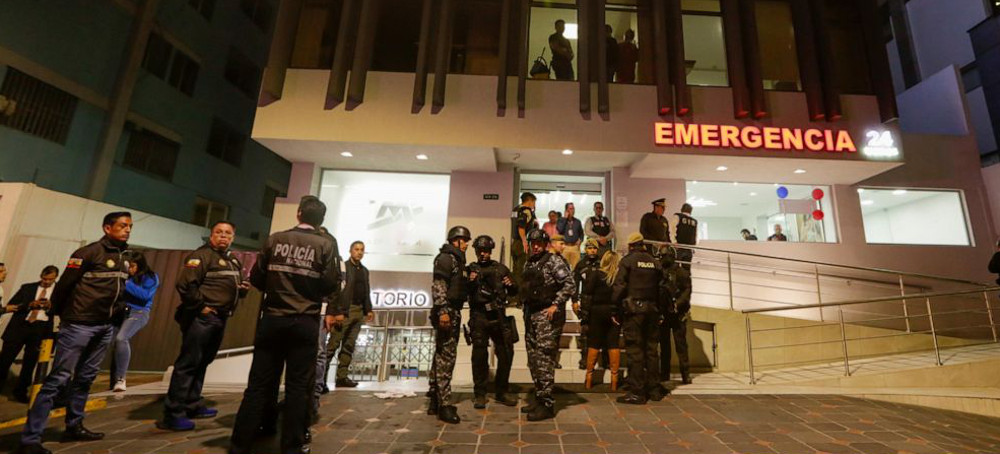 Presidential candidate Fernando Villavicencio speaks during a campaign event at a school minutes before he was shot to death outside the same school in Quito, Ecuador, Wednesday, Aug. 9, 2023. (photo: AP)
Presidential candidate Fernando Villavicencio speaks during a campaign event at a school minutes before he was shot to death outside the same school in Quito, Ecuador, Wednesday, Aug. 9, 2023. (photo: AP)
An Ecuadorian presidential candidate known for speaking up against cartels and corruption was shot and killed Wednesday at a political rally in the capital, amid a startling wave of gang-driven violence in the South American country
The assassination of Fernando Villavicencio in Quito happened Wednesday, less than two weeks before a special presidential election. He was not a frontrunner, but his killing, which President Guillermo Lasso suggested could be linked to organized crime, furthered a crisis that has already claimed thousands of lives and underscored the deep challenge that the country’s next leader will face.
Lasso declared three days of national mourning and a state of emergency that involves additional military personnel deployed throughout the country.
“Given the loss of a democrat and a fighter, the elections are not suspended; on the contrary, they have to be held, and democracy has to be strengthened,” Lasso said Thursday.
In his final speech before he was killed, Villavicencio, 59, promised a roaring crowd that he would root out corruption and lock up the country’s “thieves.”
The attorney general’s office of Ecuador said one suspect died in custody from wounds sustained in a firefight after the politician's assassination. Various operations carried out in different sectors of Quito resulted in six arrests.
Villavicencio had reported receiving multiple death threats, including from affiliates of Mexico's Sinaloa cartel, one of a slew of international organized crime groups that now operate in Ecuador. He said his campaign represented a threat to such groups.
“Here I am showing my face. I'm not scared of them,” Villavicencio said in a statement before his death, naming detained crime boss José Adolfo Macías by his alias “Fito.”
Villavicencio, one of eight candidates running for president, was the candidate of the Build Ecuador Movement.
As drug traffickers have begun to use the country’s coastal ports, Ecuadorians have reeled from violence not seen for decades. The sounds of gunfire ring in many major cities as rival gangs battle for control, and gangs have recruited children.
Just last month, the mayor of the port city of Manta was shot and killed. On July 26, Lasso declared a state of emergency covering two provinces and the country's prison system in an effort to stem the violence.
People waiting for buses Thursday morning in Guayaquil, a port city south of Quito that has been the epicenter of gang violence, expressed shock over the killing of Villavicencio.
“It shows that the violence in the country is increasing,” pharmacist Leidy Aguirre, 28, said. “Politicians supposedly have more security than citizens and this shows that not even they are safe.”
Former vice president Otto Sonnenholzner, who also is seeking the presidency, said at a news conference following Wednesday's killing, “We are dying, drowning in a sea of tears and we do not deserve to live like this. We demand that you do something.”
Videos of the rally on social media appear to show Villavicencio walking out of the event surrounded by guards. The video then shows the candidate getting into a white pickup truck before gunshots are heard, followed by screams and commotion around the truck. The sequence of events was confirmed to The Associated Press by Patricio Zuquilanda, Villavicencio’s campaign adviser.
Lasso said “the murderers” threw a grenade into the street to cover their flight, but it didn't explode. Police later destroyed the grenade with a controlled explosion, he added.
Zuquilanda said the candidate had received at least three death threats before the shooting and reported them to authorities, resulting in one detention. The campaign adviser called on international authorities to take action against the violence, attributing it to rising violence and drug trafficking.
“The Ecuadorian people are crying and Ecuador is mortally wounded,” he said. “Politics cannot lead to the death of any member of society.”
Villavicencio was one of the country's most critical voices against corruption, especially during the 2007-2017 government of President Rafael Correa.
He was an independent journalist who investigated corruption in previous governments before entering politics as an anti-graft campaigner.
Villavicencio filed many judicial complaints against high-ranking members of the Correa government, including against the ex-president himself. He was sentenced to 18 months in prison for defamation over his criticisms of Correa, and fled to Indigenous territory in Ecuador, later receiving asylum in neighboring Peru.
Edison Romo, a former military intelligence colonel, said the anti-corruption complaints made Villavicencio “a threat to international criminal organizations.”
Lasso, a conservative former banker, was elected in 2021 on a business-friendly platform and clashed from the start with the left-leaning majority coalition in the National Assembly.
A snap election was called after Lasso dissolved the National Assembly by decree in May, in a move to avoid being impeached over allegations that he failed to intervene to end a faulty contract between the state-owned oil transport company and a private tanker company.
Ecuador’s constitution includes a provision that allows the president to disband the assembly during a political crisis, but then requires new elections for both the assembly and the presidency.
Diana Atamaint, the president of the National Electoral Council, said the election date, Aug. 20, was “unalterable" due to constitutional and legal mandates, as well as electoral activities that have already been approved by the council.
The country has faced a series of political upheavals in recent years.
Authorities said that at least nine others were injured in the Wednesday shooting, including officers and a congressional candidate, in what they described as a “terrorist act.”
The killing was met with an outcry by other candidates who demanded action, with presidential front-runner Luisa González of the Citizen Revolution party saying “when they touch one of us, they touch all of us.”
Villavicencio was married and is survived by five children.
READ MORE 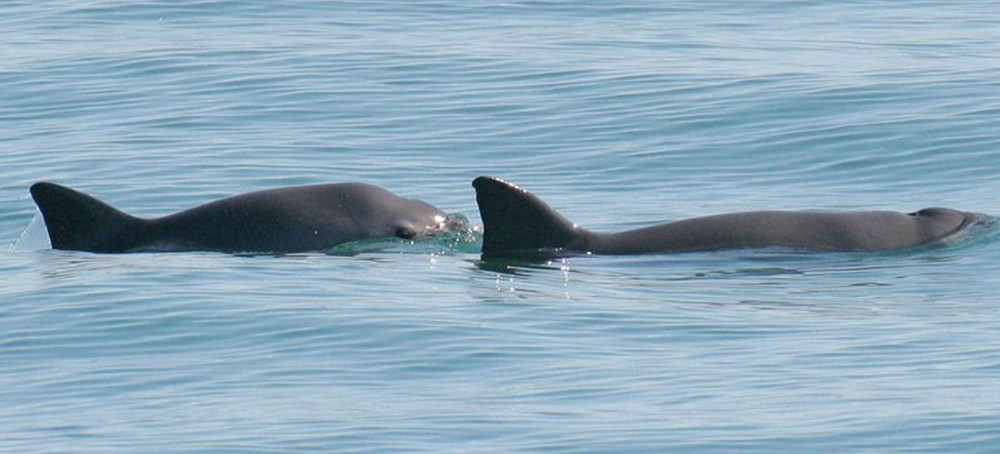 A mother and calf vaquita, a critically endangered small tropical porpoise native to MexicoÕs Gulf of California. (photo: Thomson Reuters)
A mother and calf vaquita, a critically endangered small tropical porpoise native to MexicoÕs Gulf of California. (photo: Thomson Reuters)
The critically endangered vaquita, the world's smallest porpoise and native to Mexico's Gulf of California, has been imperiled by illegal gill net fishing for an endangered fish called the totoaba, whose bladder is highly valued in Asia.
Mexico's government has been under pressure to crack down on the practice.
The IWC's scientific committee highlighted in a report an 83% drop in the vaquita's population between 2015 and 2018 to only nine or 10 of the marine animals in total.
The alert, the IWC said, stems from its belief that a new mechanism is needed "to voice extinction concerns for an increasing range of cetacean species and populations."
The institution, however, said it believes that a full enforcement of the ban on gill netting in the animal's core habitat could give the vaquita "a chance of recovery."
"The extinction of the vaquita is inevitable unless 100% of gillnets are substituted immediately with alternative fishing gears that protect the vaquita and the livelihoods of fishers," it said.
In May, the U.S. interior secretary declared that Mexico has failed to halt the illegal wildlife trade threatening the vaquita, but a trade embargo was ruled out by the U.S. government in July.
Follow us on facebook and twitter!
PO Box 2043 / Citrus Heights, CA 95611



No comments:
Post a Comment
Note: Only a member of this blog may post a comment.